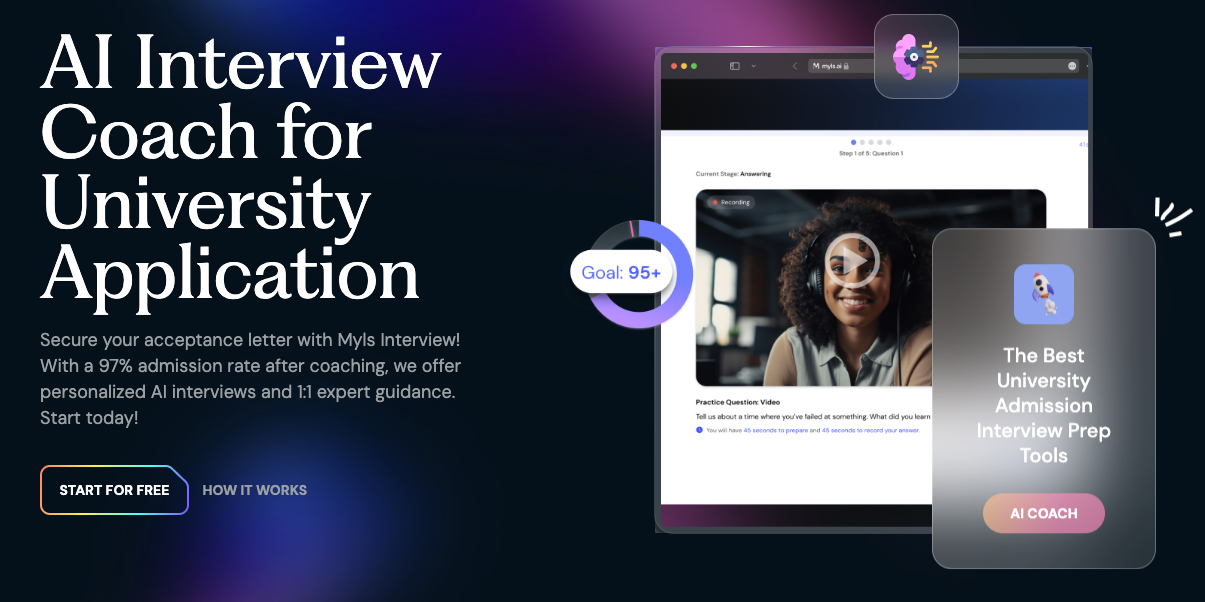High School Academic Planning: How to Build a Strong Foundation for University Success
Your high school choices shape your university future. Learn how to plan your academics, courses, and extracurriculars year by year, and discover how Myls Interview mentors can guide you through every step—from Grade 9 exploration to Grade 12 execution.

For many students, high school can feel like a checklist: take the required courses, get decent grades, join a few clubs, and hope for the best. But academic success isn’t just about checking boxes — it’s about building a pathway that sets you up for long-term growth and opportunity.
Smart academic planning gives students direction, confidence, and the flexibility to adjust as interests evolve. Whether you’re aiming for a competitive university program or still figuring out your strengths, the earlier you begin planning, the more options you’ll have when university application season comes around.
Why Academic Planning Early in High School Matters
Many students wait until Grade 12 to think seriously about university — but by then, much of the groundwork has already been laid. Universities look at your academic story across all four years, not just your final GPA.
When you start planning early, you:
- Build a transcript that shows growth, balance, and purpose
- Choose courses that meet prerequisites for your top university programs
- Discover your academic identity and subject strengths before deadlines hit
- Develop leadership and involvement that align with your future goals
- Reduce last-minute stress by creating a clear plan of action
Academic planning allows students to shift from reacting to choosing — and that’s what gives them an edge.
What to Focus On by Grade
Grade 9: Build Habits and Explore Interests
Grade 9 is your foundation year. The goal isn’t to lock in a future career — it’s to build strong habits and identify what engages you.
Focus on:
- Strengthening study skills and organization
- Building confidence in core subjects like English, Math, and Science
- Trying a few clubs or extracurriculars to explore interests
- Learning about diploma requirements and course streams
This is the best time to ask: what subjects energize me, and where do I feel most confident?
Grade 10: Connect Strengths to Potential Pathways
This is the bridge year — the final chance to explore before prerequisites matter in senior years.
Focus on:
- Choosing between academic and applied tracks based on future plans
- Continuing core subjects while trying electives tied to emerging interests
- Beginning to research post-secondary options and their requirements
- Deepening involvement in 1–2 extracurriculars that could grow into leadership roles
By the end of Grade 10, you should start narrowing down what kind of programs might be a good fit.
Grade 11: Strengthen Academics and Start Preparing
This is the most impactful year for university planning. Many universities' admissions decisions (and scholarships) are based on Grade 11 marks.
Focus on:
- Taking the right prerequisites for your top-choice programs
- Maintaining or improving your GPA
- Beginning test prep for the SAT, ACT, or language proficiency exams if needed
- Researching programs in detail and attending virtual or in-person info sessions
- Taking on leadership roles or enrichment programs (e.g., SHAD, STEM camps, DEEP)
By the end of this year, your program list should be focused and your goals more defined.
Grade 12: Execute and Finalize Your Profile
This is the year to put your planning into action. While you’re applying, you’re also finishing strong.
Focus on:
- Finalizing your course load based on admissions and your academic strengths
- Completing university applications, personal statements, and supplementary application requirements
- Managing deadlines, references, and scholarship submissions
- Preparing for university interviews or resume submissions if required
- Keeping your grades strong — most offers are conditional
The better your preparation in Grades 9–11, the more confident and in control you’ll feel in Grade 12.
How to Choose Courses Strategically
Course selection isn’t about taking the hardest options — it’s about taking the right ones. Smart course planning means:
- Ensuring you meet all prerequisites for your target university programs
- Keeping options open in case your goals shift
- Challenging yourself in areas of strength while maintaining academic balance
- Avoiding unnecessary overload that could hurt your GPA or wellness
Students often overlook opportunities like summer school, night school, or e-learning — all of which can offer flexibility or free up your Grade 12 schedule.
If you’re aiming for STEM programs, prioritize math and science early. For business, build strong English and data management skills. For arts and social sciences, maintain depth in writing and research-based subjects.
Why Extracurriculars Are Part of the Plan
Top universities' programs — from Western Ivey AEO to McMaster Health Sci — want more than high marks. They look for character, initiative, and leadership.
Students should aim for:
- Depth, not just breadth (2–3 strong commitments are better than 10 short ones)
- Long-term involvement that shows dedication and growth
- Roles that connect to your academic or career interests (e.g., robotics for engineering, debate for law or politics)
- Evidence of impact (did you lead, create, solve problems, or help others grow?)
Track your involvement in a simple resume or digital file so you’re ready for future applications or interviews.
Why Mentor Support Changes Everything
High school planning can feel overwhelming — especially when every course choice or activity seems like it could make or break your future. This is where mentorship becomes a game-changer.
A mentor helps you:
- Understand how your interests connect to real academic and career paths
- Spot gaps in your transcript or activity list before they become problems
- Choose the right balance of challenge and support in your schedule
- Set realistic, motivating goals and track your progress
- Prepare early for application requirements like interviews or personal statements
Mentors don’t just give you answers — they help you ask better questions and stay accountable to the goals you care about. They offer structure, clarity, and perspective that most students (and parents) don’t have access to in the standard school system.
How Myls Interview Helps You Plan with Purpose

At Myls Interview, we help students build forward — not just upward.
Our academic planning services include:
- 1-on-1 mentoring to build your personalized high school roadmap
- Course selection support based on strengths and post-secondary goals
- Tracking tools to map prerequisites and academic development
- Support for extracurricular direction and enrichment program planning
- Prep for interviews, resumes, and competitive applications
We meet students where they are — whether they’re just starting Grade 9 or facing big decisions in Grade 12 — and guide them through the steps that lead to clarity, confidence, and long-term success.
Final Thoughts: Build Your Future With Intention
High school isn’t just a path to graduation — it’s a foundation for everything that comes next. When you plan with purpose, your decisions gain meaning. Your achievements start to tell a story. And your future feels like something you’re shaping — not just waiting for.
Start early. Ask questions. Choose with intention. And remember: you don’t have to do it alone.
Myls Interview mentors are here to help you plan, adjust, grow, and succeed — at every stage. Sign up for free at Myls Interview and connect Myls mentors.



